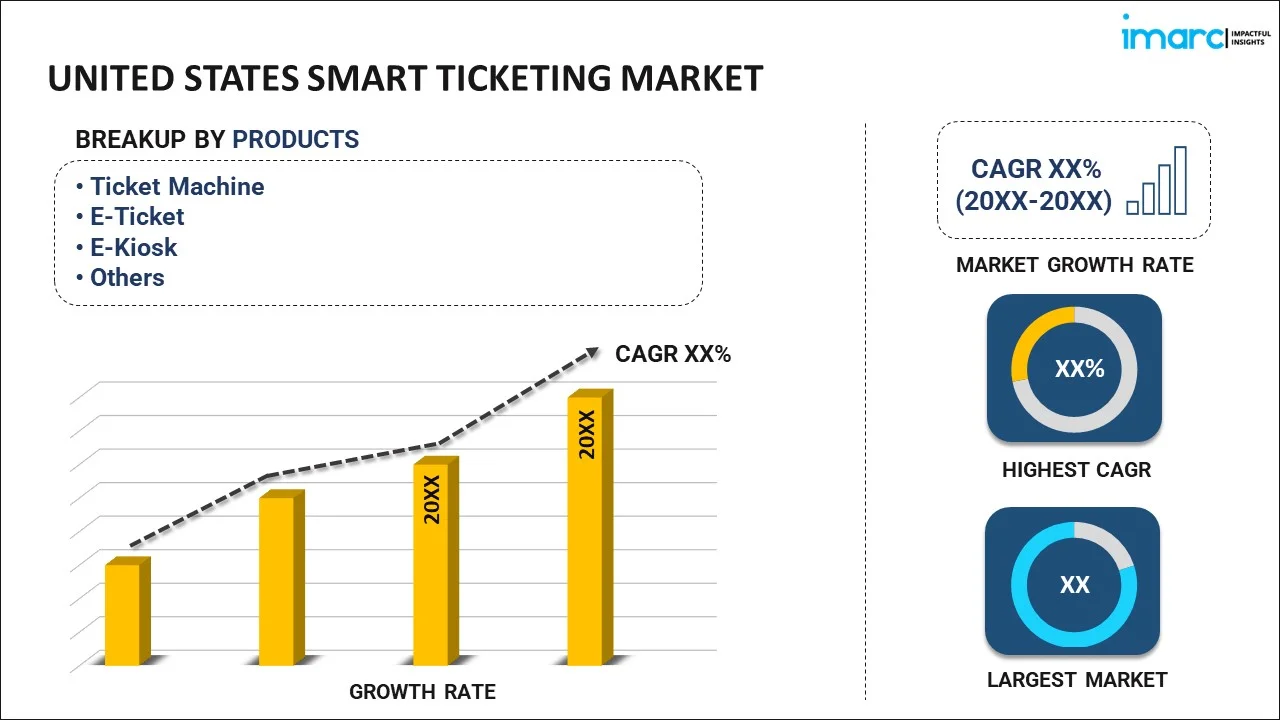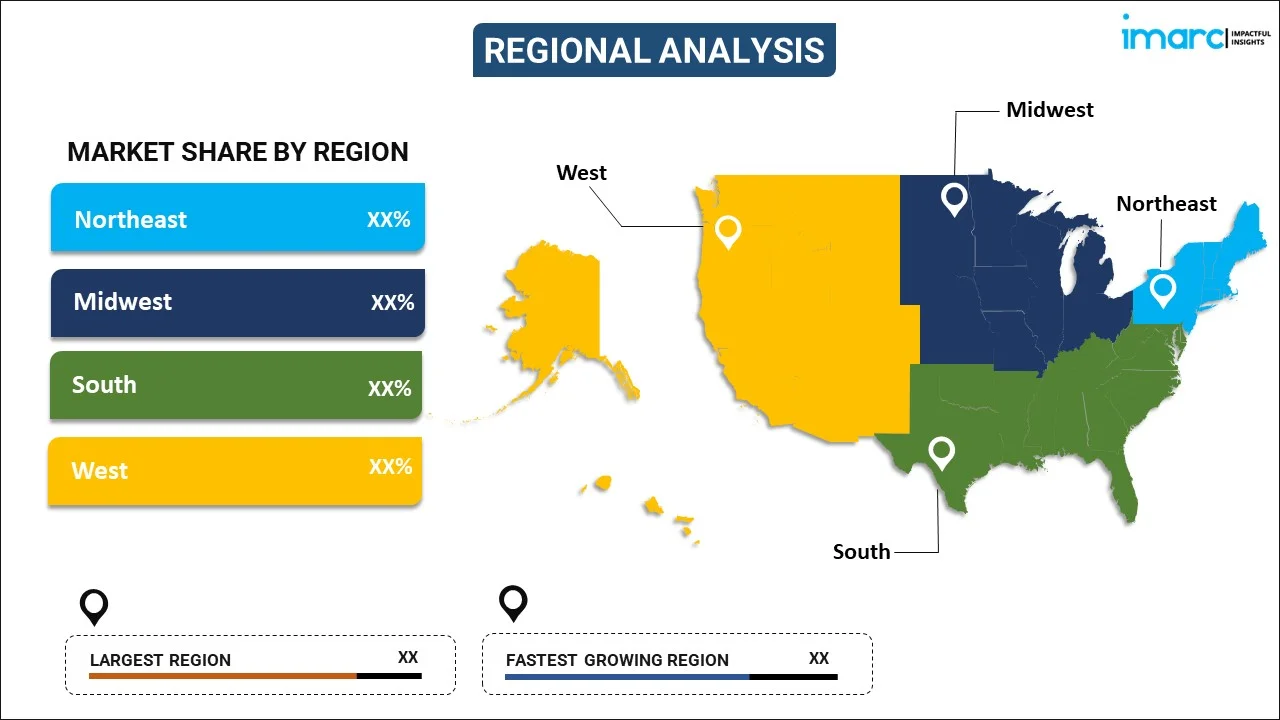
United States Smart Ticketing Market Report by Product (Ticket Machine, E-Ticket, E-Kiosk, Request Tracker, and Others), Component (Software, Hardware), System (Open Payment System, Smart Card, Near-Field Communication), Application (Sports and Entertainment, Transportation, and Others), and Region 2025-2033
Market Overview:
United States smart ticketing market size is projected to exhibit a growth rate (CAGR) of 10.53% during 2025-2033. The increasing advances in technology, particularly in the fields of mobile communication, contactless payment systems, and data analytics, which have played a crucial role in the development and adoption of smart ticketing solutions, thus surging the United States smart ticketing market share.
|
Report Attribute
|
Key Statistics
|
|---|---|
|
Base Year
|
2024 |
|
Forecast Years
|
2025-2033 |
|
Historical Years
|
2019-2024
|
| Market Growth Rate (2025-2033) | 10.53% |
United States Smart Ticketing Market Analysis:
- Growth Drivers: Increasing smartphone usage, need for contactless payment, and government backing for digital transport systems are fueling adoption of smart ticketing in transportation, entertainment, and urban mobility markets.
- Key Market Trends: The most important trends are mobile ticketing apps, the integration of NFC and QR codes, dynamic pricing approaches, and data analytics and cloud platform utilization for improved user experience and operational effectiveness.
- Market Opportunities: Rural and mid-tier city expansion, merging with MaaS platforms, and biometric authentication and AI-based ticketing system innovations offer high growth opportunities for smart ticketing companies are some of the primary points for the growth of United States smart ticketing market analysis.
- Market Challenges: Data privacy issues, cybersecurity threats, large capital investment requirements for initial infrastructure, and integration issues with old systems are among the key challenges to smart ticketing adoption in general across the United States.
Smart ticketing refers to a modernized approach to managing and accessing transportation services through digital means. Instead of traditional paper tickets, smart ticketing systems utilize technology such as RFID (Radio-Frequency Identification) or NFC (Near Field Communication) to store ticket information electronically on devices like smartphones or contactless cards. This enables seamless and convenient access to public transportation, events, or services. Smart ticketing offers benefits like faster boarding, reduced queues, and improved efficiency for both users and service providers. It often integrates with mobile apps, allowing users to purchase, store, and validate tickets easily. Additionally, smart ticketing systems contribute to a more sustainable and eco-friendly transportation ecosystem by minimizing the use of paper. Overall, smart ticketing enhances the user experience, promotes efficiency, and aligns with the digital transformation of transportation and ticketing processes.
United States Smart Ticketing Market Trends:
Mobile Integration and Contactless Solutions Transforming Ticketing Systems
The increasing demand for frictionless and hygienic interactions is compelling the United States to accept mobile and contactless ticketing solutions. Transit agencies, event planners, and service providers are focusing on mobile-first experiences that enable users to reserve, save, and authenticate tickets through smartphones and wearable devices. These solutions minimize lines, reduce physical contact, and optimize operational efficiency. QR codes, NFC cards, and mobile wallets are increasingly being integrated into ticketing systems in accordance with overall digital transformation efforts. For instance, in October 2024, Valley Metro in Phoenix rolled out Smart Fare, retiring paper passes and rolling out reloadable Copper Cards and a mobile app, providing fare-capping and convenient contactless payment for passengers. Moreover. mobile and cloud-based platforms also provide real-time updates, ticket agility, and customer personalization. The wider adoption of 4G and 5G connectivity throughout urban and semi-urban areas also increases the ease of using smart ticketing solutions for the transport and entertainment industries. As consumers look forward to convenience and immediacy in all transactions, mobile and contactless smart ticketing solutions are set to become ubiquitous in a variety of industries in the United States.
Multi-Modal Transportation Ticketing on the Rise
Growing demand for integrated and multimodal transportation networks in metropolitan areas is fueling the expansion of unified smart ticketing solutions in the U.S. These systems allow passengers to utilize one payment system or digital ticket for buses, subways, trains, and even micromobility like bike-sharing or e-scooters. This is particularly appropriate for metropolitan cities in their quest to enhance efficiency, alleviate congestion, and enhance sustainability. Governments and transport agencies are now working with technology companies to introduce interoperable platforms that allow for seamless access to multiple services. Smart ticketing is also being integrated into journey planning apps, providing end-to-end solutions from route discovery to payment and validation. The convenience of streamlined access not only increases ridership but also enables real-time data collection to improve transit planning. As urban mobility strategies move toward more integrated and user-focused models, multimodal smart ticketing is emerging as a central pillar in transportation innovation.
AI and Analytics Driving Personalization and Efficiency
Artificial intelligence (AI) and big analytics are driving a revolutionary change in the United States smart ticketing industry. These tools facilitate dynamic pricing, predictive maintenance, and customized user experiences through analysis of data on commuter habits, usage patterns, and service usage. AI-based systems can suggest best travel times, provide price cuts based on usage history, or notify users about disruptions and route alterations. Service providers are leveraging analytics to better plan capacity, save operating expenses, and identify fraud or abuse. In addition, intelligent ticketing solutions integrated with AI algorithms will be able to respond to evolving mobility trends, like, changes in commuter patterns as a result of hybrid work arrangements. This capability for personalization and response enhances customer satisfaction and system resilience. As per the sources, in August 2024, Tixbase's sole partnership with Turkey's Passo to employ Avalanche blockchain technology demonstrates increasing worldwide adoption of secure, transparent smart ticketing solutions, mirroring the same innovation waves that are defining the United States smart ticketing market. Furthermore, as digital infrastructure continues to mature, the use of AI and analytics in ticketing systems will become increasingly advanced, enabling real-time decision-making and raising the general level of user experience on transit and event platforms throughout the nation.
United States Smart Ticketing Market Segmentation:
IMARC Group provides an analysis of the key trends in each segment of the market, along with forecasts at the country level for 2025-2033. Our report has categorized the market based on product, component, system, and application.
Product Insights:

To get more information on this market, Request Sample
- Ticket Machine
- E-Ticket
- E-Kiosk
- Request Tracker
- Others
The report has provided a detailed breakup and analysis of the market based on the product. This includes ticket machine, E-ticket, E-kiosk, request tracker, and others.
Component Insights:
- Software
- Hardware
A detailed breakup and analysis of the market based on component have also been provided in the report. This includes software and hardware.
System Insights:
- Open Payment System
- Smart Card
- Near-Field Communication
The report has provided a detailed breakup and analysis of the market based on the system. This includes open payment system, smart card, and near-field communication.
Application Insights:
- Sports and Entertainment
- Transportation
- Others
A detailed breakup and analysis of the market based on application have also been provided in the report. This includes sports and entertainment, transportation, and others.
Regional Insights:

- Northeast
- Midwest
- South
- West
The report has also provided a comprehensive analysis of all the major regional markets, which include the Northeast, Midwest, South, and West.
Competitive Landscape:
The market research report has also provided a comprehensive analysis of the competitive landscape in the market. Competitive analysis such as market structure, key player positioning, top winning strategies, competitive dashboard, and company evaluation quadrant has been covered in the report. Also, detailed profiles of all major companies have been provided.
Latest News and Developments:
- In July 2025, HID acquired Spain-based Calmell Group to expand its global presence in public transportation and enhance its smart ticketing portfolio. The acquisition adds smart paper and magnetic ticket technologies to HID’s offerings and strengthens its footprint in Europe, Latin America, and Northern Africa. Calmell will join HID’s Identification Technologies Business Area, supporting broader mobility solutions and leveraging HID’s global reach to drive innovation in transit ticketing.
United States Smart Ticketing Market Report Coverage:
| Report Features | Details |
|---|---|
| Base Year of the Analysis | 2024 |
| Historical Period | 2019-2024 |
| Forecast Period | 2025-2033 |
| Units | Million USD |
| Scope of the Report | Exploration of Historical Trends and Market Outlook, Industry Catalysts and Challenges, Segment-Wise Historical and Future Market Assessment:
|
| Products Covered | Ticket Machine, E-Ticket, E-Kiosk, Request Tracker, Others |
| Components Covered | Software, Hardware |
| Systems Covered | Open Payment System, Smart Card, Near-Field Communication |
| Applications Covered | Sports and Entertainment, Transportation, Others |
| Regions Covered | Northeast, Midwest, South, West |
| Customization Scope | 10% Free Customization |
| Post-Sale Analyst Support | 10-12 Weeks |
| Delivery Format | PDF and Excel through Email (We can also provide the editable version of the report in PPT/Word format on special request) |
Key Benefits for Stakeholders:
- IMARC’s industry report offers a comprehensive quantitative analysis of various market segments, historical and current market trends, market forecasts, and dynamics of the United States smart ticketing market from 2019-2033.
- The research report provides the latest information on the market drivers, challenges, and opportunities in the United States smart ticketing market.
- Porter's five forces analysis assist stakeholders in assessing the impact of new entrants, competitive rivalry, supplier power, buyer power, and the threat of substitution. It helps stakeholders to analyze the level of competition within the United States smart ticketing industry and its attractiveness.
- Competitive landscape allows stakeholders to understand their competitive environment and provides an insight into the current positions of key players in the market.
Key Questions Answered in This Report
Smart ticketing is a digital approach to managing and accessing transportation or event tickets using technologies like RFID, NFC, or mobile apps. It replaces traditional paper tickets with electronic versions stored on smartphones or contactless cards, enabling faster boarding, reduced queues, and enhanced convenience. Smart ticketing improves user experience, streamlines operations, and supports eco-friendly, paperless transactions.
The United States smart ticketing market is projected to exhibit a CAGR of 10.53% during 2025-2033.
The United States smart ticketing market is driven by increasing demand for mobile and contactless solutions, integration of multi-modal transportation networks, and advancements in AI and analytics for personalized user experiences. Additionally, widespread 4G/5G adoption and growing focus on security, transparency through blockchain technology, and seamless payment systems are fueling market growth and encouraging adoption across transit and entertainment sectors.
Need more help?
- Speak to our experienced analysts for insights on the current market scenarios.
- Include additional segments and countries to customize the report as per your requirement.
- Gain an unparalleled competitive advantage in your domain by understanding how to utilize the report and positively impacting your operations and revenue.
- For further assistance, please connect with our analysts.
 Request Customization
Request Customization
 Speak to an Analyst
Speak to an Analyst
 Request Brochure
Request Brochure
 Inquire Before Buying
Inquire Before Buying




.webp)




.webp)












